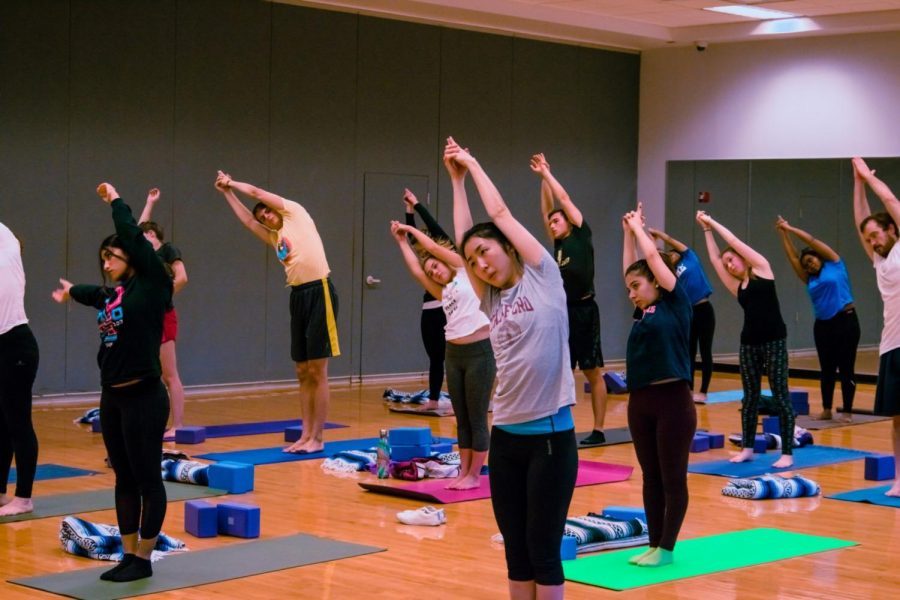At-home self-care offers free, easy stress-relief options
Students at the Campus Recreation Center East learn why self-care is important to their well-being and health through a two-hour yoga workshop in Nov. 2017. Yoga is one of the five workshop themes in Campus Recreation Self-Care Workshop series.
December 13, 2018
College students don’t need to worry about spending money to reduce stress during finals season thanks to free online meditation apps, simple breathing exercises and at-home workouts.
Without worrying about financial pressures when looking for mental health resources, students can focus on staying healthy and studying for finals.
To remain healthy, the average person is recommended to get at least 30 minutes of exercise each day, according to the Mayo Clinic.
Exercise can reduce anxiety, as studies have shown a single session of exercise can elevate your mood and reduce stress levels immediately, said Neha P. Gothe, assistant professor in AHS.
From a neurochemical standpoint, exercise reduces the levels of stress hormones in the human body such as adrenaline and cortisol.
Get The Daily Illini in your inbox!
Exercise produces endorphins, the body’s natural painkillers and mood elevators.
“From a psychological perspective, exercise can serve as a distraction or time-out, which can help you clear your mind and reduce stress,” Gothe said.
Students can choose to exercise at a gym, such as the Activities and Recreation Center, or they can exercise in their dorm room or apartment doing smaller-scale workouts.
As little as 20 minutes of exercise can reduce students’ anxiety levels, Gothe said.
“I try to exercise at least once a day, and I find that during the weeks leading up to finals, keeping up with my exercise has really helped me feel less stressed while studying,” said Avery Powell, freshman in LAS.
In addition to exercise, students are encouraged to meditate and do yoga in order to reduce stress.
Meditation and yoga are simple ways that have been scientifically proven to reduce stress and can be done in any dorm room or apartment.
“In an acute exercise study we conducted here at (Illinois), a 20-minute bout of yoga led to improve cognitive performance on tasks involving attention and processing of information in college-aged students,” Gothe said.
Focusing on breathing during both meditation and yoga can help with sustaining focus on work done after the activity.
“Rapid, shallow, erratic breathing is a common response to stress. Deep breathing exercises that are a common practice of yoga and meditation can lead to relaxation,” Gothe said.
Students can download free apps specifically designed for in-home meditation, such as Headspace, Insight Timer or Aura on their phones or tablets.
“After studying (for) a while, or after finishing an exam or a report, find a way to reward yourself. After rewarding yourself, you will refill energy and happiness to continue your studying,” said Chung-Yi Chiu, assistant professor in AHS.
In addition to exercise, meditation and yoga, adding a structure to your day and rewarding yourself with study breaks will reduce stress, Gothe said. Clearly getting a good night’s sleep, eating right and making time for studying can reduce anxiety levels during finals week.







